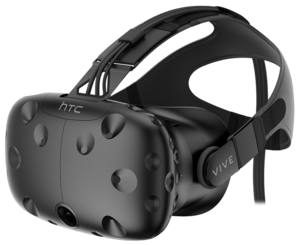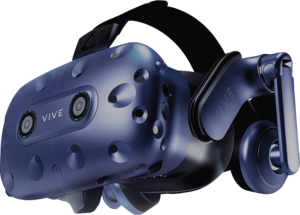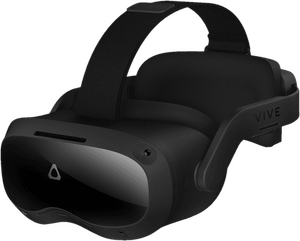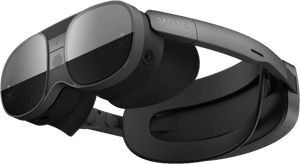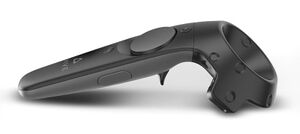Glossary:HTC Vive
 |
|
| Website | |
|---|---|
| https://www.vive.com/ | |
| Parent company | |
| HTC | |
| Founded | |
| 2015 | |
See virtual reality headset article for more information. For a list of games, see List of VR games.
The HTC Vive are a series of virtual reality headsets developed and produced by HTC.
The series started with the release of HTC Vive in April 4, 2016, and over the years, there are many VR headsets released, with some of them are standalone VR headsets.
On PC, the Vive headsets support games that utilize Valve's OpenVR API and, with the exception of the original Vive, the open-sourced OpenXR API. PC VR is usually done through HTC's streaming apps or third-party software like ALVA and Virtual Desktop on supported headsets. HTC also has their own Viveport storefront for standalone VR games and PC VR games.
General information
Availability
- HTC Vive: Steam, Amazon.com
- HTC Vive Pro: Amazon.com
- HTC Vive Pro Eye: Amazon.com
- Vive Tracker: Amazon.com
- Vive Wireless Adapter: Amazon.com
Headsets
PC VR
Vive
The HTC Vive is the first virtual reality headset released on April 4, 2016.
The Vive is the first virtual reality headset to implement the "room-scale" virtual reality. To facilitate this, the headset use the marker-based tracking with the two to four external base stations. It also contains a accelerometer, gyroscope and proximity sensor.
The Vive has the dual OLED panels with a 1080 x 1200 resolution per-eye and running at 90 Hz. The Vive also has a front-facing camera for passthrough view. The Vive must be connected to the PC using a included Link Box that contains a USB 3.0 port, a HDMI port, and a power connector.
The Vive came with two base stations and two Vive controllers by default.
General information
| Headset | ||
|---|---|---|
| Name | HTC Vive | |
| Headset type | PC VR | |
| Release date | April 4, 2016 | |
| Standard | OpenVR, Viveport | |
| Main Specification | ||
|---|---|---|
| 3D | Stereoscopic 3D | |
| Display | Type: Dual low presistence OLEDs Refresh rate: 90 Hz Resolution: 1080 x 1200 per-eye, 2160 x 1200 total |
|
| Lenses, field-of-view and IPD | Lenses: Fresnel lenses Field-of-view: 110° IPD: 61-72 mm |
|
| Tracking | Type: Outside-in marker-based tracking External base station/sensor: two to four lighthouse base stations Built-in cameras: No |
|
| Audio | Built-in audio: No Audio jack: 1 x 3.5mm combo jack. Comes with 1 x earphones. |
|
| Supported controller | Vive Controllers | |
| PC Connectivity | Method: - 1 x HDMI and 1 x USB-A 2.0 to breakout box for wired configuration. - 1 x VIVE Wireless Adapter for wireless configuration. Software: Vive software, Virtual Desktop (Steam version) |
|
| Other feature | Color passthrough view | |
Vive Pro
The HTC Vive Pro is a prosumer-orientated VR headset, released on April 4, 2018.
Compare to the Vive, the Vive Pro has the dual OLED panels sporting higher resolution of 1440 x 1600 pixels per-eye and running at 90 Hz. It also has a pair of over-ear speakers for audio, a microphone for noise cancellation analysis and a second camera for passthrough view. Unlike the original Vive which uses HDMI, the Vive Pro uses DisplayPort. The Vive Pro is also compatible with Valve's SteamVR 2.0 base stations.
A variant of the Vive Pro, the HTC Vive Pro Eye, was released on June 6, 2019. This particular variant adds built-in eye tracking.
The Vive Pro came bundled with a pair of Vive Pro Controllers and two base stations by default.
General information
| Headset | ||
|---|---|---|
| Name | HTC Vive Pro/Vive Pro Eye | |
| Headset type | PC VR | |
| Release date | April 4, 2018 (Vive Pro) June 6, 2019 (Vive Pro Eye) |
|
| Standard | OpenVR, Viveport, OpenXR | |
| Main Specification | ||
|---|---|---|
| 3D | Stereoscopic 3D | |
| Display | Type: Dual low presistence AMOLEDs Refresh rate: 90 Hz Resolution: 1440 x 1600 per-eye, 2880 x 1600 total |
|
| Lenses, field-of-view and IPD | Lenses: Fresnel lenses Field-of-view: 100° IPD: 61-72 mm |
|
| Tracking | Type: Outside-in marker-based tracking External base station/sensor: two to four lighthouse base stations or SteamVR 2.0 base stations Built-in cameras: No |
|
| Audio | Built-in audio: 2 x non-removable over-ear speakers Audio jack: No |
|
| Supported controller | Vive Pro Controllers | |
| PC Connectivity | Method: - 1 x HDMI and 1 x USB-A 2.0 to breakout box for wired configuration. - 1 x VIVE Wireless Adapter for wireless configuration. Software: Vive software, Virtual Desktop (Steam version) |
|
| Other feature | Stereo color passthrough view, eye tracking (Pro Eye only) | |
Vive Cosmos
The HTC Vive Cosmos is a VR headset released on October 3, 2019.
The Vive Cosmos has the dual LCD panels with a resolution of 1440 x 1700 per-eye and run at 90 Hz. It has a pair of removable over-ear speaker connected to a 3.5mm audio jack.
Unique to this headset is that its faceplate can be swapped for another one, and each faceplate does provide different functions. The standard faceplate that came with the base configuration has inside-out tracking support, while the Elite faceplate that came with the Elite configuration support the usual marker-base tracking.
Faceplate and controllers varies depending on the configurations.
General information
| Headset | ||
|---|---|---|
| Name | HTC Vive Cosmo | |
| Headset type | PC VR | |
| Release date | October 3, 2019 | |
| Standard | OpenVR, Viveport, Open XR | |
| Main Specification | ||
|---|---|---|
| 3D | Stereoscopic 3D | |
| Display | Type: Dual LCDs Refresh rate: 90 Hz Resolution: 1440 x 1700 per-eye, 2880 x 1700 total |
|
| Lenses, field-of-view and IPD | Lenses: Fresnel lenses Field-of-view: 110° IPD: 61-72 mm |
|
| Tracking | Type: - Inside-out tracking with the base faceplate. - Outside-in marker-based tracking with Elite faceplate. External base station/sensor: two to four SteamVR 2.0 base stations. (with Elite faceplate) Built-in cameras: 6 x cameras (4 x cameras on the base faceplate) |
|
| Audio | Built-in audio: 2 x user-removable over-ear speakers Audio jack: 3.5mm audio jack. Occupied by the over-ear speakers by default. |
|
| Supported controller | Vive Cosmos Controllers Vive Controllers |
|
| PC Connectivity | Method: - 1 x DisplayPort 1.2 and 1 x USB-A 3.0 to Link Box for wired configuration. - 1 x VIVE Wireless Adapter for wireless configuaration. Software: Vive software, Virtual Desktop (Steam version) |
|
| Other feature | Stereo grayscale passthrough view (with base faceplate) | |
Vive Pro 2
The HTC Vive Pro 2 is a prosumer-orientated VR headset released on June 3, 2021.
As a upgrade to the original Vive Pro, the Vive Pro 2 now has the dual LCD panels with a higher resolution of 2448 x 2448 per-eye and running at 120 hz. It also has a wider 120 degree field-of-view. Unlike the original Vive Pro, the Vive Pro 2 now has a pair of removable over-ear speakers that are connected to a 3.5mm audio jack.
The Vive Pro 2 can be purchased on its own, or as a bundle with a pair of Vive Pro Controllers and two SteamVR 2.0 base stations.
General information
| Headset | ||
|---|---|---|
| Name | HTC Vive Pro 2 | |
| Headset type | PC VR | |
| Release date | June 3, 2021 | |
| Standard | OpenVR, Viveport, Open XR | |
| Main Specification | ||
|---|---|---|
| 3D | Stereoscopic 3D | |
| Display | Type: Dual LCDs Refresh rate: 120 Hz Resolution: 2448 x 2448 per-eye, 4896 x 2448 total |
|
| Lenses, field-of-view and IPD | Lenses: Dual-element fresnel lenses Field-of-view: 120° IPD: 57-70 mm |
|
| Tracking | Type: Outside-in marker-based tracking External base station/sensor: two to four SteamVR 2.0 base stations. Built-in cameras: No |
|
| Audio | Built-in audio: 2 x user-removable over-ear speakers Audio jack: 3.5mm audio jack. Occupied by the over-ear speakers by default. |
|
| Supported controller | Vive Pro Controllers | |
| PC Connectivity | Method: - 1 x DisplayPort 1.2 and 1 x USB-A 3.0 to Link Box or 1 x USB-C 3.0 for wired. - 1 x VIVE Wireless Adapter for wireless configuaration. Software: Vive software, Virtual Desktop (Steam version) |
|
| Other feature | Stereo grayscale passthrough view | |
Standalone VR
Vive Focus
The Vive Focus is HTC's first standalone VR headset, released on April 15, 2019.
The Vive Focus has the dual AMOLED panels with a resolution of 1440 x 1600 per-eye and running at 75 Hz. It use the inside-out tracking with its two built-in cameras. Powering the headset is the Qualcomm Snapdragon 835 SoC, with 4 GB of system memory and 32 GB of storage. Unlike the later standalone VR headsets in the lineup, the Vive Focus can only be connected to the PC by wired.
There are two versions of the Vive Focus available: the standard model that came with a 3DoF Vive Focus Controller and the Vive Focus Plus model that came with a pair of the 6DoF Vive Focus Plus Controllers.
General information
| Headset | ||
|---|---|---|
| Name | HTC Vive Focus/Vive Focus Plus | |
| Headset type | Standalone VR | |
| Release date | April 15, 2019 | |
| Standard | OpenXR | |
| Main Specification | ||
|---|---|---|
| 3D | Stereoscopic 3D | |
| Display | Type: Dual AMOLEDs Refresh rate: 75 Hz Resolution: 1440 x 1600 per-eye, 2880 x 1600 total |
|
| Lenses, field-of-view and IPD | Lenses: Fresnel Lenses Field-of-view: N/A IPD: 60.5-74 mm |
|
| Tracking | Type: Inside-out External base station/sensor: No Built-in cameras: 2 x cameras |
|
| Audio | Built-in audio: 2 x integrated speakers Audio jack: 1 x 3.5mm audio jack |
|
| Supported controller | Vive XR Controllers | |
| PC Connectivity | Method: USB-C 3.1 Software: N/A |
|
| Standalone specification | ||
|---|---|---|
| Operating system | Custom OS based on Android | |
| System-on-chip | Qualcomm Snapdragon 835 | |
| Memory and storage | Memory: 4 GB Storage: 32 GB |
|
| Connectivity | WiFi 5 | |
| Battery capacity | 4000 mAh | |
| Other feature | Hand tracking, grayscale passthrough view | |
Vive Focus 3
The Vive Focus 3 is a standalone VR headset, released on June 27, 2021.
The Vive Focus 3 has the dual LCD panels with a resolution of 2448 x 2448 per-eye and running at 90 Hz refresh rate. Just like the original Vive Focus, the Vive Focus 3 use the inside-out tracking with its four built-in cameras. Powering the headset is the Qualcomm Snapdragon XR2 SoC, with 8 GB of system memory and 128 GB of storage. The Vive Focus 3 has optional accessories which enable face tracking and eye tracking.
The Vive Focus 3 came with a pair of Vive XR Controllers by default.
General information
| Headset | ||
|---|---|---|
| Name | HTC Vive Focus 3 | |
| Headset type | Standalone VR | |
| Release date | June 27, 2021 | |
| Standard | OpenVR, OpenXR | |
| Main Specification | ||
|---|---|---|
| 3D | Stereoscopic 3D | |
| Display | Type: Dual LCDs Refresh rate: 90 Hz Resolution: 2448 x 2448 per-eye, 4896 x 2448 total |
|
| Lenses, field-of-view and IPD | Lenses: Fresnel Lenses Field-of-view: 120° IPD: 57-72 mm |
|
| Tracking | Type: Inside-out External base station/sensor: No Built-in cameras: 4 x cameras |
|
| Audio | Built-in audio: 2 x integrated speakers Audio jack: 1 x 3.5mm audio jack |
|
| Supported controller | Vive XR Controllers | |
| PC Connectivity | Method: USB-C 3.2 or WiFi 6 Software: VIVE Business Streaming, Virtual Desktop (WiFi only) |
|
| Other feature | Eye tracking (with optional accessory), face tracking (with optional accessory) | |
| Standalone specification | ||
|---|---|---|
| Operating system | Custom OS based on Android | |
| System-on-chip | Qualcomm Snapdragon XR2 | |
| Memory and storage | Memory: 8 GB Storage: 128 GB |
|
| Connectivity | WiFi 6, Bluetooth 5.2 | |
| Battery capacity | User-replaceable 7000 mAh | |
| Other feature | Hand tracking, grayscale passthrough view | |
Vive XR Elite
The Vive XR Elite is a standalone VR headset, released on March 31, 2023.
The Vive XR Elite has dual LCD panels with a resolution of 1920 x 1920 per-eye and running at 90 Hz refresh rate, and use pancake lenses with diopter adjustment. The Vive XR Elite use the inside-out tracking with its four built-in cameras. Powering the headset is the Qualcomm Snapdragon XR2 SoC, with 12 GB of system memory and 128 GB of storage.
The battery cradle of the Vive XR Elite, which also contains a battery that is connected to the headset via USB Type-C, can be detached. This allows for swapping out the battery should the existing one is running out of charge.
The Vive XR Elite came with a pair of Vive XR Controllers by default.
General information
| Headset | ||
|---|---|---|
| Name | HTC Vive XR Elite | |
| Headset type | Standalone VR | |
| Release date | March 31, 2023 | |
| Standard | OpenVR, OpenXR | |
| Main Specification | ||
|---|---|---|
| 3D | Stereoscopic 3D | |
| Display | Type: Dual LCDs Refresh rate: 90 Hz Resolution: 1920 x 1920 per-eye, 3840 x 1920 total |
|
| Lenses, field-of-view and IPD | Lenses: Pancake lenses with diopter adjustment Field-of-view: 110°} IPD: 54-73 mm |
|
| Tracking | Type: Inside-out External base station/sensor: No Built-in cameras: 4 x cameras, 1 x depth sensor |
|
| Audio | Built-in audio: 2 x integrated speakers Audio jack: No |
|
| Supported controller | Vive XR Controllers | |
| PC Connectivity | Method: USB-C 3.2 or WiFi 6E Software: VIVE Streaming, Virtual Desktop (WiFi only) |
|
| Standalone specification | ||
|---|---|---|
| Operating system | Custom OS based on Android | |
| System-on-chip | Qualcomm Snapdragon XR2 | |
| Memory and storage | Memory: 12 GB Storage: 128 GB |
|
| Connectivity | WiFi 6E, Bluetooth 5.2 LE | |
| Battery capacity | User-replaceable 4864 mAh | |
| Other feature | Hand tracking, color passthrough view | |
Controllers and peripherals
- HTC Vive is compatible with Valve Index controllers and peripherals and vice versa.
Vive Controllers
Includes 2 positionally tracked motion controllers each with a touchpad and trigger akin to the Steam Controller, two face buttons, and 2 grip buttons.
Vive Tracker
The Vive tracker is a standalone tracking device to track real world objects in VR, such as a DSLR, bodyparts and specially designed accessories like the Hyper Blaster Gun.
Vive Wireless Adapter
The Vive Wireless Adapter is an accessory that allows the PC-VR-only Vive headsets to be connected to the PC wirelessly. THe PC must have a optional PCIe WiGiG card to work.
System requirements
HTC Vive
| Windows | ||
|---|---|---|
| Minimum | Recommended | |
| Operating system (OS) | 7 SP1, 8.1, 10 | |
| Processor (CPU) | Intel Core i5-4590 AMD FX 8350 | |
| System memory (RAM) | 4 GB | |
| Hard disk drive (HDD) | ||
| Video card (GPU) | NVIDIA GeForce GTX 970 AMD Radeon R9 290 | NVIDIA GeForce GTX 1060 AMD Radeon RX 480 |
| Other | 1x USB 2.0 HDMI 1.4 or DisplayPort 1.2 | |
Vive Pro and Vive Pro Eye
| Windows | ||
|---|---|---|
| Minimum | Recommended | |
| Operating system (OS) | 7, 8.1 | 10, 11 |
| Processor (CPU) | Intel Core i5-4590 AMD FX 8350 | |
| System memory (RAM) | 4 GB | |
| Hard disk drive (HDD) | ||
| Video card (GPU) | NVIDIA GeForce GTX 970 AMD Radeon R9 290 | NVIDIA GeForce GTX 1070/Quadro P5000 AMD Radeon Vega 56/Pro WX7100/FirePro W9100 |
| Other | 1x USB 3.0 DisplayPort 1.2 | |
- Driver is required to download and install before using VIVE Pro Eye's dual cameras with Windows® 7.
Vive Cosmos and Cosmos Elite
| Windows | ||
|---|---|---|
| Minimum | Recommended | |
| Operating system (OS) | 10 | 10, 11 |
| Processor (CPU) | Intel Core i5-4590 AMD FX 8350 | |
| System memory (RAM) | 4 GB | 8 GB |
| Hard disk drive (HDD) | ||
| Video card (GPU) | NVIDIA GeForce GTX 970 4GB AMD Radeon R9 290 4GB | NVIDIA GeForce GTX 1070/Quadro P5000 AMD Radeon Vega 56/Pro WX7100/FirePro W9100 |
| Other | 1x USB 3.0 DisplayPort 1.2 | |
HTC Vive Pro 2
| Windows | ||
|---|---|---|
| Minimum | Recommended | |
| Operating system (OS) | 10 | 10, 11 |
| Processor (CPU) | Intel Core i5-4590 AMD Ryzen 5 1500 | |
| System memory (RAM) | 8 GB | |
| Hard disk drive (HDD) | ||
| Video card (GPU) | NVIDIA GeForce GTX 1060 AMD Radeon RX 480 | NVIDIA GeForce RTX 2060 AMD Radeon RX 5700 |
| Other | 1x USB 3.0 DisplayPort 1.2 | |
HTC Vive XR Elite
| Windows | ||
|---|---|---|
| Minimum | ||
| Operating system (OS) | 10, 11 | |
| Processor (CPU) | Intel Core i5-4590 AMD Ryzen 5 1500X |
|
| System memory (RAM) | 8 GB | |
| Hard disk drive (HDD) | ||
| Video card (GPU) | NVIDIA GeForce GTX 1060 6 GB AMD Radeon RX 580 |
|
| Other | 1x USB 3.0 DisplayPort 1.2 or 1x USB Type-C 3.0 or WiFi 5 (5 GHz) or WiFi 6/6E (5 GHz or 6 GHz) |
|

